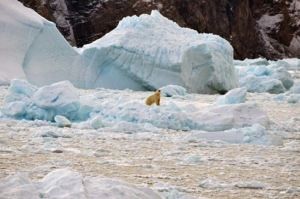News
Science News in Brief: More meltwater in Greenland can have serious climatic consequences
This article is more than 8 years old.
In other stories, Danish eating habits raise CO2 emissions, and cost overruns dog new science building

If researchers are right, soon he won’t be the only one suffering the effects of global warming (photo: NASA’s Oceans Melting Greenland mission)
The rate that the ice sheet in Greenland is melting has more than doubled compared to the rate measured from 1983-2003, Danish researchers reveal. Measurements taken in Young Sound in northeastern Greenland show that the total amount of fresh water in the fjord has risen from around one metre in 2003 to four metres in 2015, DR Nyheder reports.
Fresh water displaces the nutrient-rich salt water and can have serious repercussions for living organisms in the water. In addition, when it runs off from the land, a lot of mud is carried with it that lies on the surface blocking out sunlight and reducing the numbers of plankton on which fish depend for food.
The earth’s climate can also be altered because of changes to the way water circulates in the North Atlantic. If the warm water stream is weakened, it can mean colder weather for northern Europe. The worst possible scenario would be colder water around the Norwegian coast and sea ice moving further south.
Danes not so green on CO2 emissions
An EU-wide study puts households in Denmark fifth from bottom when it comes to their carbon footprint. Although the country as a whole is doing well, individual households are lagging behind, reports Videnskab.dk. It is especially food that is the culprit – followed by things such as furniture and the fuel used in transport. “Higher CO2 emissions are typically connected to ready meals that need a lot of energy to produce – for example frozen pizzas,” said Diana Ivanova from the technical and natural science university in Trondheim, one of the authors of the study. “But it can also be a sign of heavy consumption of meat and animal products in general.”
Costs rocket on new science building
A prestigious new University of Copenhagen building, which is designed to put its natural sciences department in the forefront worldwide in terms of modern research, has run into massive cost overruns. Ventilation systems and plumbing have been installed in the Niels Bohr Building that are way below standard, reports Politiken. The cost of remedying the situation has been estimated at around 1 billion kroner. Inabensa, the Spanish company responsible for installing the systems, was fired on February 10. But the Danish buildings and property agency, Bygningsstyrelsen, has been coming increasingly under fire for not keeping the contractors under a tight enough supervisory rein. Meanwhile, the university has indicated it may not move into the building when it is finally completed because the rent will be too high.
Funds allocated to monitor Iran’s atomic program
The government has announced the allocation of 4.75 million kroner to the International Atomic Energy Authority to assist in checking whether Iran lives up to the conditions surrounding its atomic energy program. The foreign minister, Anders Samuelsen, said: “It is vital that Iran never acquires atomic weapons – that would destabilise international security.” The funding covers the period from 2017-2019 and is a follow-up to money allocated in 2015. It will contribute to sending inspectors to Iran’s nuclear plants as well as to taking samples, analysis and the running of laboratories.










































